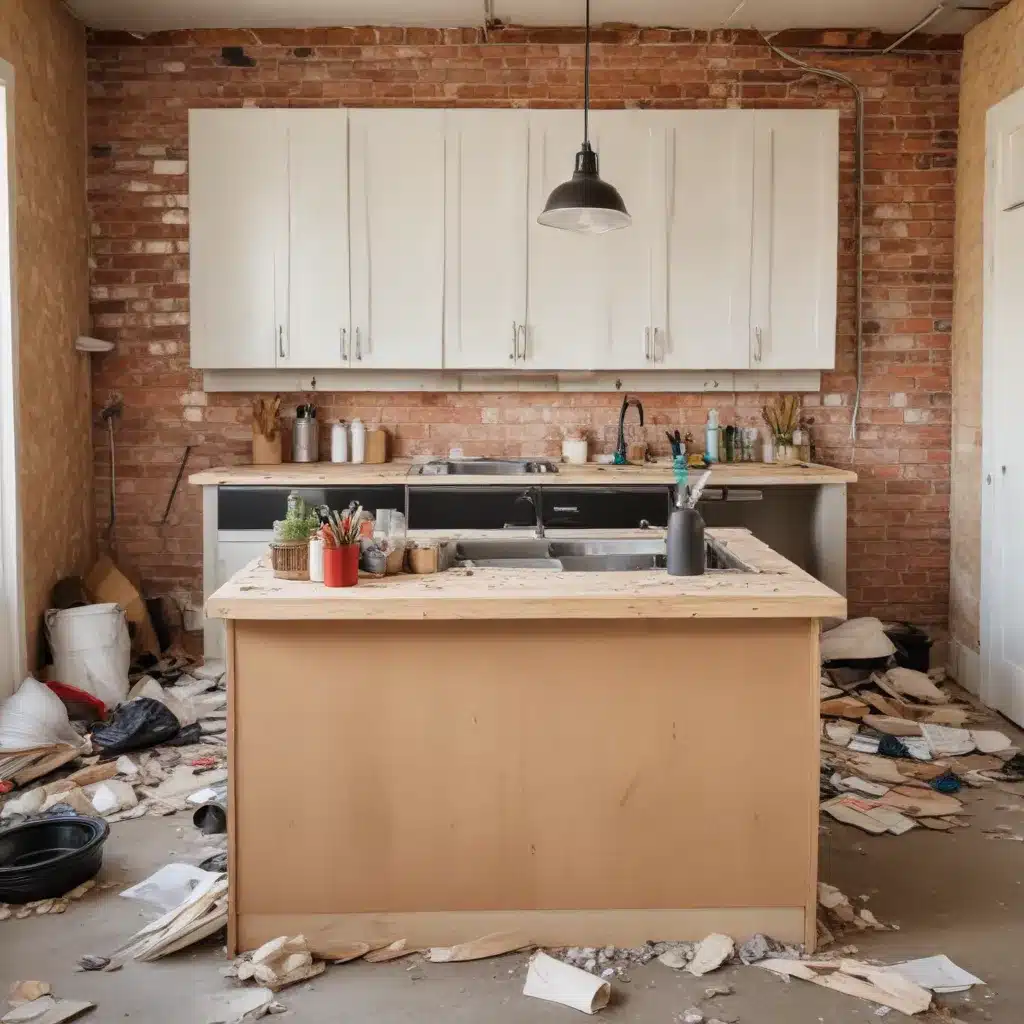
As an experienced home improvement consultant, I’ve seen firsthand how renovations can generate mountains of waste. But it doesn’t have to be that way. With the right strategies and a little creativity, you can turn your renovation into an eco-friendly masterpiece.
Sustainable Renovation Practices
Waste Reduction Strategies
The key to minimizing renovation waste starts long before the first hammer swing. By carefully planning your project and optimizing your material usage, you can dramatically reduce the amount of debris heading to the landfill.
One of the most effective strategies is conducting a thorough pre-demolition assessment. This allows you to identify which materials can be salvaged, repurposed, or recycled, rather than simply tossing them out. From vintage hardwood flooring to antique fixtures, many older materials can find new life in your renovation or be donated to local reuse programs.
Additionally, prioritizing modular and prefabricated construction techniques can minimize on-site waste. These methods optimize material usage and reduce the amount of cutting and trimming required. By opting for standardized component sizes, you’ll create less excess that would otherwise end up in the dumpster.
Material Recycling Techniques
When it comes to the waste you can’t avoid, recycling should be your next line of defense. Research your local recycling programs and make a plan to segregate materials accordingly. Common items like metal, glass, and certain plastics are often easily recyclable, while more complex materials may require specialized handling.
For tricky items like plasterboard or insulation, connect with eco-conscious waste management providers who can ensure responsible disposal or recycling. Many Reluctant Renovator readers have had success partnering with organizations like Mobile Skips to handle construction debris.
Construction Site Management
Maintaining a tidy and organized construction site is not only good for productivity but also for minimizing waste. Implement a system for collecting, sorting, and storing materials to prevent damage or misplacement. Designate specific areas for recyclables, reusables, and general waste to streamline the disposal process.
Consider investing in on-site waste compaction equipment to reduce the volume of your garbage. This can significantly cut down the number of dumpster trips, saving you time and money while reducing your environmental footprint.
Eco-Friendly Disposal Options
Donation and Repurposing
Before throwing out any materials, explore opportunities for donation or repurposing. Reach out to local charities, community centers, or organizations that specialize in reclaiming construction materials. They may be able to give your unwanted items a second life, whether it’s through their own projects or by passing them on to those in need.
For items that can’t be donated, get creative with repurposing. Turn old doors into headboards, transform reclaimed wood into shelving, or upcycle discarded tiles into unique accent walls. The possibilities are endless when you approach your renovation waste with an innovative mindset.
Responsible Waste Segregation
Proper waste segregation is crucial for ensuring materials are disposed of or recycled correctly. Invest in a range of labeled containers or skip bins to sort your renovation debris by type, such as wood, metal, plastic, and organic waste. This makes it easier to identify recycling streams and minimize the amount of waste headed to landfills.
Specialized Disposal Services
In addition to traditional waste removal, many municipalities and private companies now offer specialized disposal options for renovation and construction waste. Research services in your area that handle hazardous materials, like asbestos or lead-based paint, or provide composting or upcycling programs for organic debris.
By utilizing these eco-friendly disposal services, you can rest assured that your renovation waste is being handled responsibly and with minimal environmental impact.
Construction Material Selection
Sustainable Material Choices
When sourcing materials for your renovation, prioritize products that are eco-friendly, recyclable, and responsibly sourced. This includes options like reclaimed timber, low-VOC paints, bamboo flooring, and recycled-content tiles.
By making sustainable material choices, you’re not only reducing waste but also contributing to a more circular economy. These products often have a lower carbon footprint and can be easily repurposed or recycled at the end of their useful life.
Lifecycle Assessment
Before committing to a material, take the time to conduct a lifecycle assessment. This involves evaluating the environmental impact of a product from extraction to disposal. Consider factors like embodied energy, water usage, and end-of-life disposal options to make an informed decision that aligns with your sustainability goals.
Resource Efficiency
Maximizing resource efficiency is key to minimizing renovation waste. Opt for modular, customizable, or prefabricated building components that can be easily adapted to your project’s unique needs. This reduces the amount of excess material you’ll have to dispose of.
Additionally, choose materials with high recycled content or recyclability to support the circular economy and reduce the strain on natural resources.
Renovation Project Planning
Pre-Demolition Assessments
As mentioned earlier, conducting a thorough pre-demolition assessment is crucial for identifying salvageable materials and developing a comprehensive waste management plan. This step allows you to strategize how to reuse, recycle, or responsibly dispose of each component of your renovation waste.
Waste Minimization Goals
Set clear waste minimization goals for your renovation project, such as aiming to divert a certain percentage of debris from landfills or targeting zero-waste status. These objectives will guide your decision-making and help you stay accountable throughout the process.
Disposal Logistics
Carefully plan your renovation disposal logistics to ensure efficient and eco-friendly waste management. This may involve renting skip bins or dumpsters from specialized providers, coordinating with local recycling centers, or securing pick-up services for bulky or hazardous materials.
By addressing these logistical considerations upfront, you can minimize disruptions, avoid costly mistakes, and maintain a clean, organized construction site.
Embarking on a renovation can be an exciting journey, but it’s crucial to prioritize sustainability and responsible waste management. By incorporating these eco-friendly disposal hacks into your project, you can transform your renovation into a shining example of environmental stewardship.
Remember, every little bit helps when it comes to minimizing our collective impact on the planet. So, let’s do our part and create a greener, cleaner future – one renovation at a time.



